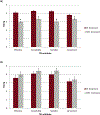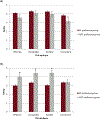A Cross-Sectional Study Assessing Treatment Preference of People With Chronic Low Back Pain
- PMID: 29852151
- PMCID: PMC6650271
- DOI: 10.1016/j.apmr.2018.04.027
A Cross-Sectional Study Assessing Treatment Preference of People With Chronic Low Back Pain
Abstract
Objective: To assess treatment preference and attributes of 2 exercise-based treatments for people with chronic low back pain (LBP).
Design: Cross-sectional study.
Setting: Academic research setting.
Participants: Individuals (N=154) with chronic LBP.
Interventions: Not applicable.
Main outcome measures: Participants completed a treatment preference assessment (TPA) measure that described 2 treatments for chronic LBP (strength and flexibility [SF] and motor skill training [MST]). Participants rated each treatment on 4 attributes: effectiveness, acceptability/logicality, suitability/appropriateness, and convenience. An overall score for each treatment was calculated as the mean of the 4 attribute ratings. The participants indicated either (1) no treatment preference or (2) preference for SF or MST.
Results: One hundred four participants (67.5%) had a treatment preference; of those, 95 (91.3%) preferred SF and 9 (8.7%) preferred MST. The SF preference group rated SF higher than MST overall and on all attributes (all Ps <.01, ds ranged from .48-1.07). The MST preference group did not rate the treatments differently overall or on any of the attributes (all Ps >.05, ds ranged from .43-.66). Convenience of SF (P=.05, d=.79) and effectiveness (d=1.20), acceptability/logicality (d=1.27), and suitability/appropriateness (d=1.52) of MST (all Ps <.01) were rated differently between the 2 preference groups.
Conclusions: When presented with 2 treatment options, a majority of patients preferred SF over MST. Convenience was a particularly important attribute affecting preference. Assessing treatment preference and attributes prior to treatment initiation allows the clinician to identify factors that may need to be addressed to enhance adherence to, and outcomes of, treatment.
Trial registration: ClinicalTrials.gov NCT02027623.
Keywords: Exercise therapy; Low back pain; Motor skill; Patient preference; Rehabilitation; Spine.
Copyright © 2018 American Congress of Rehabilitation Medicine. Published by Elsevier Inc. All rights reserved.
Figures
Similar articles
-
Treatment preference changes after exposure to treatment in adults with chronic low back pain.PM R. 2023 Jul;15(7):817-827. doi: 10.1002/pmrj.12897. Epub 2022 Oct 24. PM R. 2023. PMID: 36106673 Free PMC article. Clinical Trial.
-
Communication Skills Training for Practitioners to Increase Patient Adherence to Home-Based Rehabilitation for Chronic Low Back Pain: Results of a Cluster Randomized Controlled Trial.Arch Phys Med Rehabil. 2017 Sep;98(9):1732-1743.e7. doi: 10.1016/j.apmr.2017.02.025. Epub 2017 Mar 28. Arch Phys Med Rehabil. 2017. PMID: 28363702 Clinical Trial.
-
Skill training preferences and technology use in persons with neck and low back pain.Disabil Rehabil Assist Technol. 2017 Nov;12(8):801-807. doi: 10.1080/17483107.2016.1269208. Epub 2016 Dec 30. Disabil Rehabil Assist Technol. 2017. PMID: 28034325
-
Putting Physical Activity While Experiencing Low Back Pain in Context: Balancing the Risks and Benefits.Arch Phys Med Rehabil. 2016 Feb;97(2):245-251.e7. doi: 10.1016/j.apmr.2015.09.020. Epub 2015 Oct 22. Arch Phys Med Rehabil. 2016. PMID: 26471211
-
Attributes Underlying Non-surgical Treatment Choice for People With Low Back Pain: A Systematic Mixed Studies Review.Int J Health Policy Manag. 2021 Mar 14;10(4):201-210. doi: 10.34172/ijhpm.2020.49. Int J Health Policy Manag. 2021. PMID: 32610721 Free PMC article.
Cited by
-
CDC Clinical Practice Guideline for Prescribing Opioids for Pain - United States, 2022.MMWR Recomm Rep. 2022 Nov 4;71(3):1-95. doi: 10.15585/mmwr.rr7103a1. MMWR Recomm Rep. 2022. PMID: 36327391 Free PMC article.
-
Treatment preference changes after exposure to treatment in adults with chronic low back pain.PM R. 2023 Jul;15(7):817-827. doi: 10.1002/pmrj.12897. Epub 2022 Oct 24. PM R. 2023. PMID: 36106673 Free PMC article. Clinical Trial.
-
Patients' real-world engagement with movement pattern modifications for nonarthritic hip-related pain.PM R. 2025 Jul;17(7):761-770. doi: 10.1002/pmrj.13343. Epub 2025 Feb 15. PM R. 2025. PMID: 39953925
-
The feasibility and acceptability of an app-based cognitive strategy training programme for older people.Pilot Feasibility Stud. 2023 Jun 30;9(1):109. doi: 10.1186/s40814-023-01334-x. Pilot Feasibility Stud. 2023. PMID: 37391842 Free PMC article.
-
A Semantic-Based Cognitive Training Programme on Everyday Activities: A Feasibility and Acceptability Study among Cognitively Healthy Older Adults.Occup Ther Int. 2023 Aug 23;2023:2153223. doi: 10.1155/2023/2153223. eCollection 2023. Occup Ther Int. 2023. PMID: 37664163 Free PMC article.
References
Publication types
MeSH terms
Associated data
Grants and funding
LinkOut - more resources
Full Text Sources
Other Literature Sources
Medical
Miscellaneous



